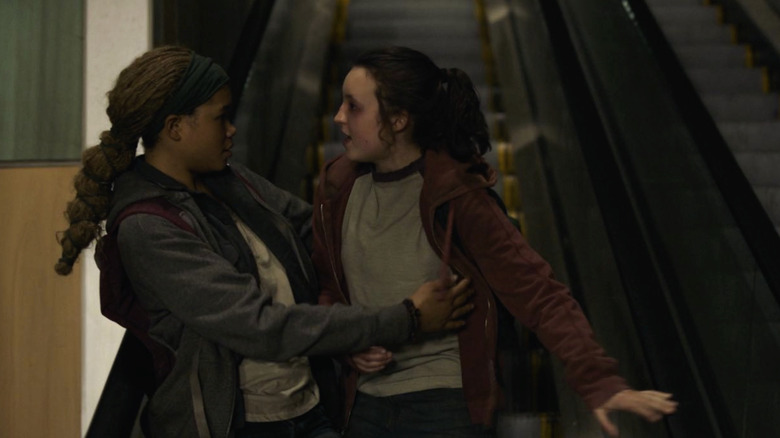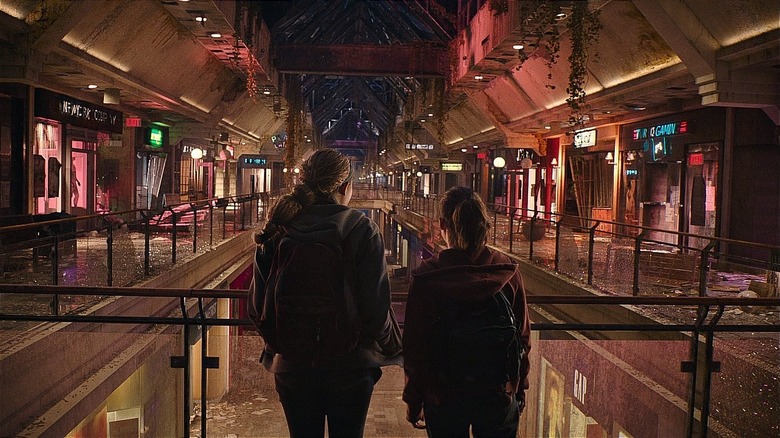The Last Of Us Episode 7's Use Of A-Ha's Take On Me Is A Callback To The Games
This post contains spoilers for HBO's "The Last of Us" and the video game series of the same name.
While we weren't looking, pop music has become one of the main recurring motifs of "The Last of Us" over the last few years. Though the retro needle drop has become a large staple of modern pop culture, showrunners Craig Mazin and Neil Druckmann are not just following trends. In the Fall chapter of the story, Joel (Pedro Pascal) admits to Ellie (Bella Ramsey) that he used to want to be a singer when he was a little boy (a nod to Joel's original voice actor, Troy Baker's singing career). This would lead to the opening scene of the game's sequel, "The Last of Us Part II," in which Joel serenades Ellie with "Future Days" by Pearl Jam, a song that soon becomes the entire emotional throughline of the narrative, bookending Ellie's entire character journey.
"The Last of Us" series has only deepened the connection between this story and pop music. The pilot episode gave Joel and Ellie's first adventure a theme song of its own by needle-dropping "Never Let Me Down" by Depeche Mode, which is as catchy and memorable as it is reflective of their unique bond. Famously, episode 3 of the series brought "Long Long Time" by Linda Ronstadt into vogue by building an entire tragic, gay love story around Bill (Nick Offerman) and Frank (Murray Bartlett) around it.
This week's episode, "Left Behind" continues the pop song motif multiple times, from Etta James' "I Got You Babe" to a remix of The Cure's "Just Like Heaven" and Pearl Jam's "All or None." My personal favorite needle drop in the episode, A-ha's "Take On Me," is a callback to Ellie's love life in the games.
A parallel between Ellie's two major loves
As the mall powers up in front of Ellie's eyes, she gets to experience a moving escalator for the very first time. As she gleefully runs back and forth the descending steps in front of Riley, "Take On Me" non-dietetically plays over the scene. To those who are new to this story, it might just seem like a small moment, but hardcore fans of games know that an explicit parallel is being drawn.
Both the game and the show's takes on the "Left Behind" chapter serve as the very first reveal of Ellie's lesbian identity to their respective audiences, depicting her relationship with her best friend/first love Riley Abel (Storm Reid) and their time together living at a FEDRA military boarding school. However, "The Last of Us Part II" (and the eventual season 2 of the series) only continues to make Ellie's sexuality an important part of her character and story. During her time living in the Jackson commune, Ellie develops a slow-burn romance with her friend Dina, who might have made an early appearance in episode 6 of the series.
Once the plot of the second game kicks into gear and Ellie embarks on her revenge-quest through Seattle, Dina accompanies her on her journey, playing a major role in the game's story. As the player's main companion for the majority of the game's first act, you get to spend a lot of time watching Ellie and Dina interact. They talk about their hopes and dreams, officially label each other as girlfriends, and fight together through a ruined Seattle Quarantine Zone.
Love manifest itself, even in an apocalypse
Most notably, there's an optional music store sidequest in the first Seattle chapter of the game where the player is allowed to serenade Dina with an acoustic cover of "Take On Me," a brilliant, tender, and romantic scene that is emblematic of what has always made "The Last of Us" special as a video game. It doesn't further the main plot, nor is it an expensive action set-piece; but just a singular moment where the characters (and player) are allowed to bond with each other and breathe in between all the pain and misery. In a world of sorrow, the lingering moments of joy are ultimately what makes these characters feel real.
That same attitude towards storytelling is the basis behind the "Left Behind" chapter. Riley showing Ellie the "four wonders of the mall" for an entire episode might not be relevant to Joel's current injury, but it's important that we spend these moments with Riley so we know exactly what Ellie lost, and why she chooses to fight for Joel's safety.
Now that we're revisiting Riley's story with this adaptation, the choice to associate the two biggest loves of Ellie's life with "Take On Me" feels poignant. It feels like this is Neil Druckmann's way of expressing that one can find love over and over again, even in the middle of the apocalypse. In a way, Ellie's love for Riley lives on in Dina, which is appropriate for a story about humanity and our interconnectedness, through violence and love.

